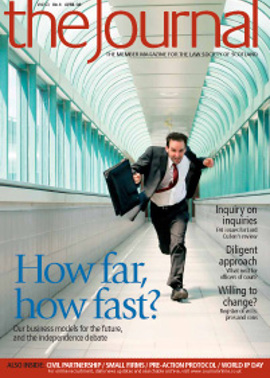Conscience and public service

Registration officers in England & Wales (the equivalent of our district registrars) were not legally employed by the local authorities that paid them until the coming into force in December 2007 of the Statistics and Registration Service Act 2007, s 69. One consequence of this is that they had no recourse to employment tribunals. An inequity resolved by the 2007 Act doubtless, but it is rather disheartening that one of the first claims by a registrar to an employment tribunal has been made against Islington Council, on the basis of that council’s refusal to exempt her from being involved in the registration of civil partnerships. She claims it would be an infringement of her right under article 9 of the European Convention to freedom of religion and conscience to force her to register the civil partnerships of same-sex couples.
Now, unlike the position in (for example) South Africa, the UK’s Civil Partnership Act 2004 contains no provision permitting registrars to refuse to officiate at civil partnership registrations. The government resisted calls from certain groups for the inclusion of a so-called “conscience clause”, similar to that which permits health-care professionals to refuse to assist at terminations of pregnancy (Abortion Act 1967, s 4(1)). They were right to do so, for the abortion analogy is not good, for at least three reasons: health care professionals are not carrying out public duties in the way that registrars are; abortion is not an inherent and necessary part of health care, in the way that registration of civil partnership is within the registration system; and refusing to perform abortions does not constitute systemic discrimination against an equality-vulnerable class. Invoking article 9 is an attempt to introduce by the back door a conscience clause that does not exist on the face of the 2004 Act.
Authorised or obliged?
In Scotland the Registrar General has a duty under s 87 of the Civil Partnership Act 2004 to authorise such number of district registrars as is thought necessary for “the purpose of affording reasonable facilities throughout Scotland for registration as civil partners”. This is the same duty as is found in s 17 of the Marriage (Scotland) Act 1977 in relation to civil marriages. Not all district registrars are authorised to officiate at either civil marriages or civil partnerships. Some may conduct both, some either and some neither.
It is for individual local authorities (which employ district registrars and which determine the terms of their employment and their range of duties) to assess the local need for registrars to be involved in each aspect of the registration process. So there is scope in the system for an individual district registrar not to be authorised to conduct civil partnership registrations. The question, which is more likely to arise in smaller local authority areas, is whether a district registrar can be obliged to accept authorisation to register civil partnerships.
Some guidance may be obtained from a recent decision of the employment appeal tribunal in the case of McClintock v Department for Constitutional Affairs (EAT/0223/07, October 2007). Here, a justice of the peace sought to be relieved from dealing with adoption cases which might involve him having to make an adoption order in favour of a same-sex couple, and when his request was refused he felt obliged to resign. His claim for unfair dismissal was rejected by the EAT on the ground that judges could not “cherry pick” which laws to apply and which to refuse to deal with.
That case, however, did not tackle head-on the ECHR point. The jurisprudence from Strasbourg indicates very clearly that article 9 is infringed only if the exercise of the right of religion and conscience is made very much more difficult by the rule or procedure that is being challenged. Seldom will terms and conditions of employment be enough for that purpose if the employee has a choice of seeking other employment. In Kjeldsen, Busk Madsen and Pedersen v Denmark (1976) 1 EHRR 711 parents’ claims for an infringement of their right to philosophical and religious objection to sex education in state schools were rejected on the ground that they had the option of educating their children at home. In Ahmad v UK (1981) 4 EHRR 126 a teacher who wanted to absent himself from teaching duties in order to attend prayers at particular times had his article 9 claim rejected because he had accepted a contract of employment which did not accommodate such absences, he had not brought his religious requirements to the employer’s notice when seeking employment, and he was at all times free to seek other employment which would accommodate his religious observances. The applicants’ claims in both Konttinen v Finland (1996) 87-A DR 68 and Stedman v United Kingdom (1997) 23 EHRR CD 168 were rejected because, having found that their working hours conflicted with their religious convictions, they were free to relinquish their posts.
In the public service
Might a local authority refuse to employ an applicant for a post of district registrar on the basis that the applicant would refuse, if employed, to take part in civil partnership registrations? While I see the argument that people with strong religious or philosophical convictions should not themselves be discriminated against in their employment opportunities, I think this has to be countered by emphasising the public servant nature of the post of district registrar. Once Parliament has decided to put in place a registration system for same-sex couples, it is for public servants to accept the policy decisions that have been made.
The proposition that public servants have a right to religious or philosophical objections to public processes really needs to be resisted, because it is impossible to draw a line other than the one Parliament has already drawn in setting out the duties attached to the post. A registrar may well oppose mixed-race marriages, but cannot expect to have that view accommodated in their performance of their public duties, because society and the law have a stronger interest in ensuring race equality. To allow an opt-out for civil partnership is to treat homophobia differently from racism and to regard it as in some measure legitimate. Clothing the claim in religiosity does not make it any more acceptable.
Genuine requirements
We are, of course, still getting used to sexual orientation being an unlawful ground for discrimination, and often statutory exceptions are made. The Employment Equality (Sexual Orientation) Regulations 2003 prohibit sexual orientation discrimination in employment, though reg 7 contains two troubling exceptions: (1) where “having regard to the nature of the employment or the context in which it is carried out, (a) being of a particular sexual orientation is a genuine and determining occupational requirement, and (b) it is proportionate to apply that requirement”; and (2) where the employment is for the purposes of an organised religion and discrimination is necessary “(i) so as to comply with the doctrines of that religion, or (ii) so as to avoid conflicting with the strongly held religious convictions of a significant number of the religion’s followers”.
There have been no cases on these exceptions, though both are worryingly broad. It is not difficult to imagine claims that particular employments have heterosexuality as a genuine occupational requirement. After all, most jobs that have gender as a requirement assume heterosexuality. Why else do we insist that only female police officers can strip-search female suspects? And the religious exception allows any church to refuse to employ a gay person in any capacity whatsoever, from clergy to cleaner, if either its leaders’ scriptural interpretations or the convictions of a significant number of its members support that.
Rights in balance
Perhaps, however, the political environment is changing. When the Equality Act (Sexual Orientation) Regulations 2007 made sexual orientation discrimination in the provision of goods and services unlawful, the major opposition came from religious bodies who ran adoption and fostering agencies and who wished to be able to continue their practice of discriminating against gay and lesbian people by refusing to provide them with adoption and fostering services. The government, slightly surprisingly, resisted this and instead gave voluntary adoption agencies an exemption, but only until 31 December 2008 (2007 Regulations, reg 15). There are only two voluntary adoption agencies in Scotland, both run by the Roman Catholic Church, and they will need to change their practices (but not their employment policies).
In conclusion, neither the refusal to employ nor the dismissal of anyone unwilling to conduct civil partnership registrations would be legally challengeable. There is no interference in either case with the right to religious freedom because that right must, as with the other rights under the European Convention, be balanced with the rights of others. The right of gay and lesbian people not to suffer discrimination is weightier than the right of others to practise discrimination in the name of religious freedom.
Kenneth McK Norrie is a Professor of Law in the University of Strathclyde
My thanks are due to Mrs Lynn Rodgers of General Registers of Scotland who provided me with factual information. Any opinion expressed thereon is mine alone.
In this issue
- Thinking ahead
- A line too often crossed
- Big leap forward
- Independence: still viable?
- FAIs: a new lease of life
- ARTL: Turquoise is in the pink
- Summary trials: deciding the facts
- Life at the sharp end
- Conscience and public service
- Wills and ways
- Achieving "senior" rates?
- CPD: the way forward
- Life on the edge
- Pre-action protocol for industrial disease claims
- Fit a doin'?
- Same difference
- Curiosity corner
- System? What system?
- Reviewing appeals
- Testing insolvency
- Scottish Solicitors' Discipline Tribunal
- Website reviews
- Book reviews
- Day of creation
- Lawyer behind the camera
- Homing in on home reports






